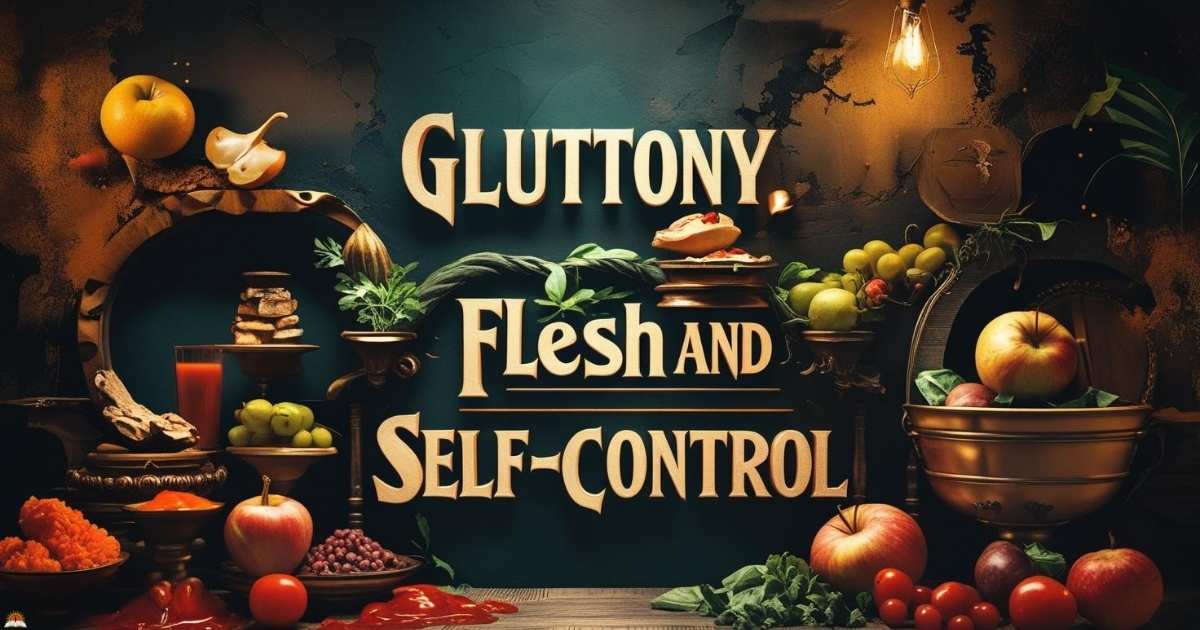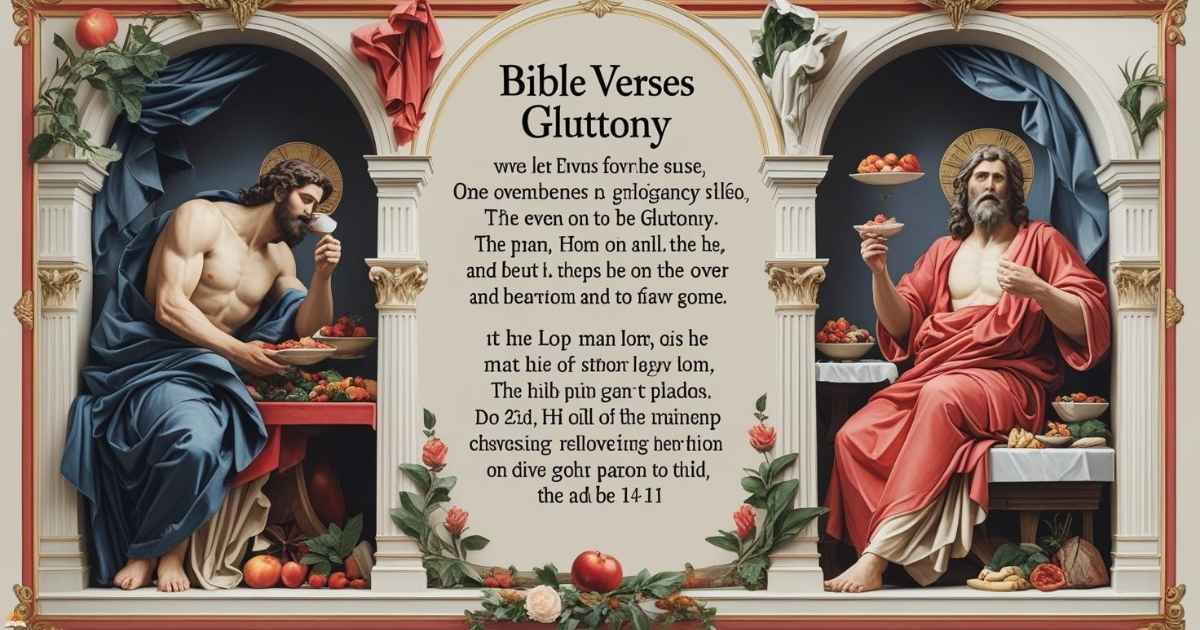Gluttony is the overconsumption of food or drink to the point of waste, excess, or loss of self-control. In the biblical sense, it is more than just eating too much—it reflects a heart that seeks satisfaction in physical pleasure rather than in God. It often points to a deeper spiritual issue, such as lack of discipline, emotional emptiness, or misplaced priorities. Gluttony can slowly dull the spirit, making a person more focused on comfort than on purpose. At its root, it is not just a physical act, but a condition of the soul that calls for awareness, balance, and intentional living.
This guide brings together powerful verses that reveal the deeper meaning behind unhealthy cravings and overindulgence. It offers clear insight, practical reflection, and spiritual encouragement to help you walk in balance and self-control.
Proverbs and Wisdom on Gluttony
Each verse below is presented in the structure you requested, ensuring direct relevance to the topic of gluttony and overindulgence. No unrelated verses are included.
Proverbs 23:20-21
“Do not join those who drink too much wine or gorge themselves on meat, for drunkards and gluttons become poor, and drowsiness clothes them in rags.”
Description: This verse offers a strong warning against associating with people who overindulge in food and drink.
Explanation: It ties gluttony to laziness, poverty, and poor life outcomes. The verse implies that unchecked indulgence leads not only to physical consequences but also to moral and social decline. It teaches that gluttony is not just a private habit but a path to destruction when it becomes a lifestyle.
Proverbs 23:2
“And put a knife to your throat if you are given to appetite.”
Description: A graphic image urging immediate restraint for those tempted by overindulgence.
Explanation: The verse uses hyperbole to show how seriously one should resist gluttonous tendencies. It reflects the need for self-discipline when faced with rich food and the temptation to lose control. It is a dramatic call to pause, reflect, and master desire before it masters you.
Proverbs 25:16
“If you find honey, eat just enough—too much of it, and you will vomit.”
Description: Even good things can become harmful when taken in excess.
Explanation: This proverb teaches moderation. Honey symbolizes something sweet and enjoyable, but the verse cautions that even blessings, when consumed without limits, can make one sick. The message is clear: enjoy in balance, avoid indulgence.
Proverbs 28:7
“A discerning son heeds instruction, but a companion of gluttons disgraces his father.”
Description: A call to choose companions wisely and follow the path of wisdom.
Explanation: Being around gluttonous people can influence one’s behavior and lead to disgrace. This verse emphasizes the importance of surrounding oneself with those who value discipline. It connects gluttony not just to personal failure but to family and reputation.
Proverbs 23:1-3
“When you sit to dine with a ruler, note well what is before you, and put a knife to your throat if you are given to gluttony. Do not crave his delicacies, for that food is deceptive.”
Description: A warning about falling into temptation when surrounded by luxury or status.
Explanation: This passage speaks to how easily gluttony can sneak in when faced with abundance. The rich food of rulers can be alluring, but it often comes with unseen costs. The advice urges caution, restraint, and awareness of the deeper traps that excessive eating can lead to—like pride, distraction, or dependency.
Gluttony and Spiritual Blindness

Philippians 3:19
“Their destiny is destruction, their god is their stomach, and their glory is in their shame. Their mind is set on earthly things.”
Description: This verse describes people who live to satisfy their bodily cravings rather than seek spiritual truth.
Explanation: It directly equates gluttony with idolatry—placing the stomach above God. When physical desires rule, spiritual clarity fades. The verse warns that indulging the flesh leads to spiritual ruin and eternal loss. It calls believers to lift their focus above earthly satisfaction.
Romans 13:13-14
“Let us behave decently, as in the daytime, not in orgies and drunkenness, not in sexual immorality and debauchery, not in dissension and jealousy. Rather, clothe yourselves with the Lord Jesus Christ, and do not think about how to gratify the desires of the flesh.”
Description: A powerful call to leave behind flesh-driven living and walk in spiritual discipline.
Explanation: Gluttony is grouped with other sinful behaviors like drunkenness and immorality. The verse shows that feeding the flesh dims the light of Christ in our lives. Instead of making room for indulgence, believers are told to clothe themselves in Christ, which means adopting His values and self-control.
Galatians 5:19-21
“The acts of the flesh are obvious: sexual immorality, impurity and debauchery; idolatry and witchcraft; hatred, discord… envy; drunkenness, orgies, and the like. I warn you, as I did before, that those who live like this will not inherit the kingdom of God.”
Description: Paul outlines the dangerous results of a life ruled by fleshly cravings.
Explanation: Gluttony fits within the larger picture of indulgence, lust, and lack of restraint. The sobering warning at the end makes clear that such a lifestyle separates people from God. This verse pushes the reader to evaluate not just what they consume, but what controls them.
1 Peter 4:3
“For you have spent enough time in the past doing what pagans choose to do—living in debauchery, lust, drunkenness, orgies, carousing and detestable idolatry.”
Description: Peter urges believers to leave behind excessive and undisciplined living.
Explanation: The verse points to gluttony and overconsumption as part of a past life—something to move away from in Christ. It speaks of wasted time and spiritual stagnation that comes from feeding sinful desires. The tone is urgent, inviting readers to grow beyond shallow pleasures.
1 Corinthians 10:7
“Do not be idolaters as some of them were; as it is written: ‘The people sat down to eat and drink and got up to indulge in revelry.’”
Description: A reference to the Israelites who turned to self-indulgence instead of worshiping God.
Explanation: The verse warns against using food and drink as idols. When people let celebration turn into excess, they risk walking away from God. It is a reminder that gluttony is more than overeating—it can become a gateway to rebellion and spiritual blindness.
Old Testament Warnings About Overindulgence
Deuteronomy 21:20
“They shall say to the elders of his city, ‘This son of ours is stubborn and rebellious; he will not obey us. He is a glutton and a drunkard.’”
Description: A depiction of a wayward son whose life is marked by rebellion and overindulgence.
Explanation: This verse shows that gluttony was viewed as a serious failure in character, not just a personal habit. It connects excessive eating and drinking with disobedience, laziness, and moral downfall. In ancient Israel, this type of behavior reflected shame not just on the individual, but on the family and community.
Ezekiel 16:49
“Now this was the sin of your sister Sodom: She and her daughters were arrogant, overfed and unconcerned; they did not help the poor and needy.”
Description: Gluttony appears here as a social and spiritual failure tied to pride and selfishness.
Explanation: Many think of Sodom’s sins as sexual, but this verse reveals deeper roots: arrogance, gluttony, and apathy. Being “overfed and unconcerned” shows how overindulgence can lead to hardened hearts and indifference to suffering. Gluttony becomes dangerous when it dulls compassion and numbs conscience.
Isaiah 5:11-12
“Woe to those who rise early in the morning to run after their drinks, who stay up late at night till they are inflamed with wine. They have harps and lyres at their banquets, tambourines and flutes and wine, but they have no regard for the deeds of the Lord, no respect for the work of his hands.”
Description: A strong rebuke of those who live in luxury and excess, ignoring God.
Explanation: This verse paints a vivid picture of people immersed in pleasure and abundance. Their senses are filled, but their souls are empty. Gluttony here is part of a lifestyle that drowns out God’s voice and ignores His purpose. The warning is clear: when we live for constant satisfaction, we forget the One who provides it.
Psalm 78:29-31
“They ate till they were gorged—he had given them what they craved. But before they turned from what they craved, while the food was still in their mouths, God’s anger rose against them; he put to death the sturdiest among them, cutting down the young men of Israel.”
Description: A cautionary moment in Israel’s history when craving led to judgment.
Explanation: God allowed the people to satisfy their appetite, but their greed revealed hearts that had not changed. The lesson is sobering: gluttony may feel harmless, but it can expose a deeper rebellion. Consuming without gratitude or restraint leads to spiritual downfall and divine correction.
Job 15:27
“Though his face is covered with fat and his waist bulges with flesh…”
Description: A poetic image describing someone bloated with pride and self-indulgence.
Explanation: This verse uses physical excess as a symbol for arrogance and spiritual blindness. It reflects how gluttony can be both a symptom and a cause of a hardened heart. The physical description mirrors the spiritual state—puffed up, unaware, and far from humility.
Also Read More >>> 40 New Year Powerful Prayer Points With Bible Verses
Gluttony, Flesh, and Self-Control

1 Corinthians 6:19-20
“Do you not know that your bodies are temples of the Holy Spirit, who is in you, whom you have received from God? You are not your own; you were bought at a price. Therefore honor God with your bodies.”
Description: A direct call to treat the body with honor and purpose.
Explanation: This verse reminds us that the body is sacred. Gluttony disrespects that design. When we overindulge, we risk using our bodies for comfort rather than for God’s glory. Respecting physical health is not vanity—it is spiritual responsibility. This truth reframes self-control as worship, not restriction.
1 Corinthians 9:27
“But I discipline my body and keep it under control, lest after preaching to others I myself should be disqualified.”
Description: Paul shares his personal commitment to bodily discipline.
Explanation: This verse shows that even the most faithful leaders must guard against indulgence. Paul trains his body like an athlete—not to boast, but to remain focused and spiritually sharp. Gluttony weakens resolve. Discipline strengthens mission. The message is clear: without control, even truth-tellers can lose credibility.
Galatians 5:22-23
“But the fruit of the Spirit is love, joy, peace, forbearance, kindness, goodness, faithfulness, gentleness and self-control. Against such things there is no law.”
Description: Self-control is not just a personal trait—it is a spiritual fruit.
Explanation: Gluttony stands in direct opposition to the fruit of self-control. This verse highlights that spiritual maturity is marked by restraint, not impulse. True strength is shown in moderation. When the Spirit leads, cravings lose their grip. Growth becomes more about surrender than struggle.
2 Peter 2:19
“They promise them freedom, while they themselves are slaves of depravity—for people are slaves to whatever has mastered them.”
Description: A warning against being mastered by desires that feel freeing.
Explanation: Gluttony can disguise itself as pleasure or comfort. But when it takes control, it becomes bondage. This verse strips away the illusion: whatever controls you owns you. What begins as a choice can turn into chains. The path to freedom lies in choosing mastery by the Spirit, not the stomach.
Matthew 4:4
“Jesus answered, ‘It is written: Man shall not live on bread alone, but on every word that comes from the mouth of God.’”
Description: Jesus declares that spiritual nourishment is greater than physical hunger.
Explanation: This verse, spoken during a time of deep hunger, sets the tone for battling gluttony. It is a reminder that life is not sustained by food alone. When cravings rise, God’s Word can fill what food never will. Jesus models reliance on spiritual truth over physical need, offering the perfect weapon against overindulgence.
Choosing Discipline and Eternal Value

Hebrews 12:16
“See that no one is sexually immoral, or is godless like Esau, who for a single meal sold his inheritance rights as the oldest son.”
Description: A clear example of short-term craving leading to long-term loss.
Explanation: Esau’s story is a warning about giving in to physical urges. He traded something eternal for a temporary meal. That is the heart of gluttony—choosing what feels good now instead of what brings lasting value. Discipline protects what matters most. The verse calls readers to honor spiritual inheritance above fleshly appetite.
Matthew 6:25
“Therefore I tell you, do not worry about your life, what you will eat or drink; or about your body, what you will wear. Is not life more than food, and the body more than clothes?”
Description: Jesus shifts focus from physical needs to eternal priorities.
Explanation: This verse challenges the anxious obsession with food and appearance. Gluttony often grows from worry—using food as comfort. Jesus teaches that life is more than satisfying the stomach. True peace comes from trusting God’s provision. Freedom from gluttony starts by letting go of fear.
Psalm 141:4
“Do not let my heart be drawn to what is evil so that I take part in wicked deeds along with those who are evildoers; do not let me eat their delicacies.”
Description: A prayer asking God to protect the heart from indulgent temptation.
Explanation: The psalmist understands that gluttony begins in the heart. Rich food, when shared in the wrong company, can become a spiritual trap. This verse is a personal cry for discernment. It reminds us that what we eat—and who we eat with—can shape the soul. Discipline often begins with what we refuse.
Proverbs 21:17
“Whoever loves pleasure will become poor; whoever loves wine and olive oil will never be rich.”
Description: A truth about the cost of indulgent living.
Explanation: Gluttony may seem harmless, but it drains more than the body—it empties purpose, clarity, and focus. This proverb warns that when pleasure becomes the goal, loss follows. The love of comfort often leads to spiritual and practical poverty. Fulfillment comes not through more, but through wise moderation.
1 Corinthians 10:31
“So, whether you eat or drink or whatever you do, do it all for the glory of God.”
Description: A guiding principle for how believers should approach every action—including eating.
Explanation: This verse ties even the smallest acts to worship. Eating becomes a spiritual practice when done with gratitude and purpose. Gluttony turns the focus inward. This verse turns it upward. Discipline, awareness, and balance become ways to honor God. It redefines food not as a craving to control us, but as a gift to glorify Him.
You May Also Like:
40 Bible Verses About Clarity
60 Bible Verses About Family Problems
What is the Biblical Sin of Gluttony?
The biblical sin of gluttony is the excessive consumption of food or drink driven by selfish desire, not genuine need. It reflects a lack of self-control and often points to deeper spiritual emptiness. Gluttony is considered sinful because it places physical craving above obedience to God. A clear example is Esau, who gave up his birthright for a single meal. His hunger led him to trade something sacred for something temporary, revealing how gluttony can lead to poor, lasting choices.
Examples of Gluttony in the Bible
Several moments in Scripture reveal how gluttony leads to spiritual and physical consequences. These examples show how unchecked desire can cloud judgment and separate people from God’s will:
- Esau – Traded his birthright for a single meal (Genesis 25:29-34)
- The Israelites in the wilderness – Craved meat and were struck with a plague (Numbers 11:31-34)
- The rich man in Luke 16 – Feasted daily while ignoring the poor beggar, Lazarus (Luke 16:19-31)
- The rebellious son – Called a glutton and drunkard (Deuteronomy 21:20)
- The people in Isaiah’s time – Overindulged and ignored God’s work (Isaiah 5:11-12)
How to Overcome Gluttony #Bible?
Overcoming gluttony requires both spiritual focus and practical action. The Bible offers clear steps that lead to balance and discipline:
- Pray for self-control – Ask God daily for strength (Galatians 5:22-23).
- Practice gratitude – Eat with thankfulness, not impulse (1 Timothy 4:4-5).
- Fast occasionally – Refocus your hunger toward God (Matthew 6:16-18).
- Avoid temptation – Stay away from situations that lead to excess (Proverbs 23:2).
- Honor your body – Treat it as God’s temple (1 Corinthians 6:19-20).
Conclusion
Gluttony is not just about how much a person eats. It is about what fills the heart, what drives choices, and where one places value. Through these Bible verses, it becomes clear that gluttony is a deeper issue of discipline, purpose, and spiritual focus. This article helped bring that truth into light with scripture that speaks plainly, firmly, and with grace.
Whether someone is seeking to understand gluttony, break unhealthy patterns, or grow closer to God, these verses offer wisdom and direction. The Bible does not shame. It invites reflection, change, and balance.
Living with self-control is not about restriction. It is about choosing what brings life.
For more heartfelt wishes, powerful prayers, and uplifting Bible verses, visit HolyBiblePraise.com — your peaceful corner of faith and prayer!

I’m Talal Mudassar, the founder of HolyBiblePraise.com, with over three years of experience in blogging about the Bible, faith, and Christian teachings. My passion is to create insightful, biblically accurate, and inspiring content that helps believers grow spiritually. Through HolyBiblePraise, I aim to make God’s Word more accessible and meaningful for everyone. Let’s grow in faith together!

